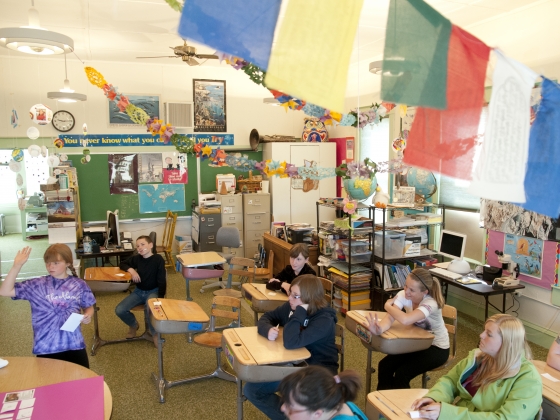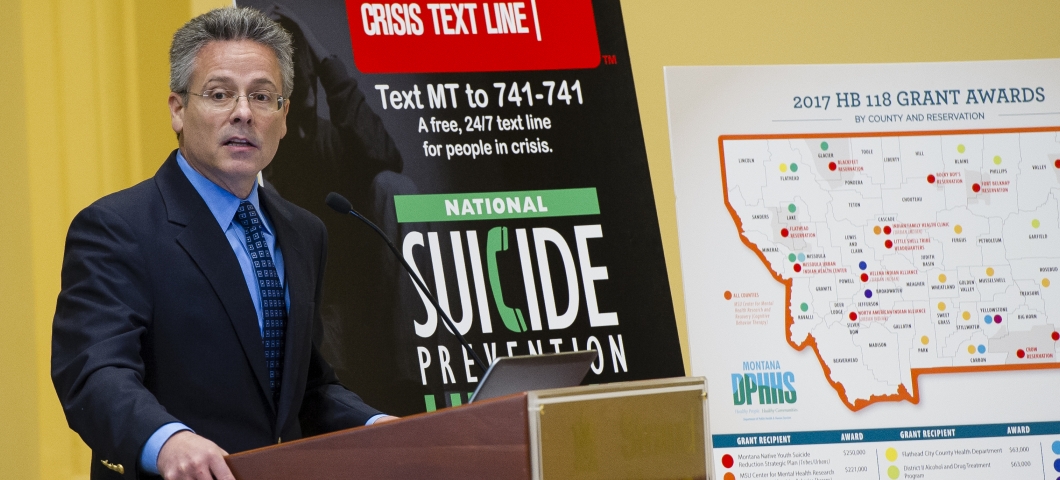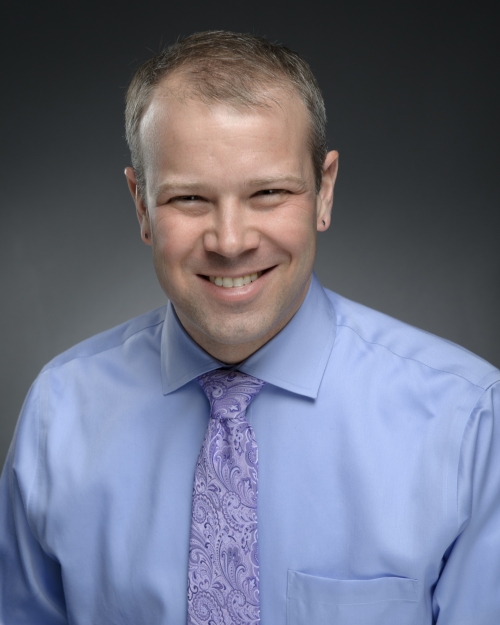Integrating Teaching, Discovery and Outreach
Supporting our land-grant mission
MSU offers programs to support rural educators, school districts

Students from varying grade levels study together in the Bynum Elementary School May 11, 2012. In recognition of the teaching and administrative challenges unique to small, spread-out school districts, MSU has implemented a variety of programs to support rural communities. MSU photo by Kelly Gorham
MAY 17, 2018
BOZEMAN – Lynne Peterson had been employed as a school teacher in Red Lodge and Salt Lake City for more than two decades when she decided, in 2013, to pursue a master of education in educational leadership. The Montana State University program in which she enrolled enabled her to earn the degree while continuing to teach. After earning a master’s in 2015, Peterson transitioned from a 28-year teaching career to become a superintendent and high school principal in her hometown of Savage, a rural community in northeastern Montana.
“I haven’t regretted one moment of it,” Peterson said of her decision to pursue a master’s. “Every day has been interesting.”
In recognition of the teaching and administrative challenges unique to small, spread-out school districts, MSU has implemented a variety of programs to support rural communities. Those include an internship offered in collaboration with the Board of Public Education and Office of Public Instruction (which Peterson completed), the Montana Rural Colloquium, a rural practicum program available to MSU students studying education, and a popular program known as the Indian Leadership Education and Development (or ILEAD) Project. Read more about the rural education program.
State of Montana awards MSU pair of grants for suicide prevention programs

Montana State University Center for Mental Health Research and Recovery director, Matthew Byerly, makes remarks during a press conference to announce a pair of grants for suicide prevention programs Monday, April 23, 2018 at Montana State University in Bozeman. MSU photo by Kelly Gorham
APRIL 23, 2018
BOZEMAN — Montana State University has received a pair of grants from the state of Montana to expand two current evidence-based suicide prevention programs.
The grants come after the 2017 Legislature passed, and Gov. Steve Bullock signed, House Bill 118 to provide $1 million for suicide prevention in Montana. A total of $750,000 was allocated for schools and community organizations to implement evidence-based suicide prevention programs. The remaining funds support continued implementation of the Montana Native Suicide Reduction Strategic Plan.
From those funds, MSU’s Center for Mental Health Research and Recovery received two grants: a $221,000 grant to offer an online cognitive behavior therapy depression program statewide and a $157,000 grant to implement the Youth Aware of Mental Health program within the Great Falls School District.
“We at MSU are pleased to contribute to the state of Montana’s important suicide prevention efforts,” said Dr. Matt Byerly, director of the MSU Center for Mental Health Research and Recovery. “Both of these projects have the potential to significantly impact people throughout our state in a positive way.”
The computerized cognitive behavior therapy depression program, known as Thrive-Montana, primarily uses video to deliver confidential, evidence-based care to anyone with internet access, said Mark Schure, an assistant professor in MSU’s Department of Health and Human Development, who is leading the Thrive-Montana project. To read more abou the suicide prevention grants.
MSU researcher’s study shows LGBQ students less likely to stay in STEM majors

APRIL 4, 2018
BOZEMAN — For years, researchers have known that it is hard to attract and keep women and some minorities in science, technology, engineering and math – or STEM – fields. Now, a Montana State University researcher has found that the same problem applies to sexual minorities.
Many have suspected the findings, but MSU professor Bryce Hughes’ study, “Coming Out in STEM: factors affecting retention of sexual minority STEM students,” published in the March 14 issue of Science Advances, was the first to provide quantitative evidence, he said. Hughes, an assistant professor of adult and higher education in the College of Education, Health and Human Development, found students who identified as lesbian, gay, bisexual or queer were 7 percent less likely than their heterosexual peers to complete their STEM degree.
Hughes analyzed data from a national survey given to university students in their first and fourth years in school to see whether first-year students who identified as LGBQ and planned to pursue a STEM major were still enrolled in a STEM major by their fourth year. The Higher Education Research Institute at UCLA collected the data in 2011 and 2015 from more than 4,000 students at 78 institutions across the U.S. Hughes said because of statistical limitations with the data collected, he did not specifically look at experiences of transgender and gender non-conforming students, but plans to in future work. Read more about LGBQ students in STEM.
MSU task force proposes new program for students with intellectual and developmental disabilities

Christy Sofianek, program coordinator of the MSU Life Scholars Program, speaks during the "Diversity Includes Disability: Inclusive Higher Education at MSU" lecture at the first annual Diversity Symposium, Thursday, March 29, 2018, in the Strand Union Building at Montana State University in Bozeman, Mont. MSU photo by Adrian Sanchez-Gonzalez.
MARCH 30, 2018
BOZEMAN — A proposal to offer a new educational program at Montana State University for students with intellectual and developmental disabilities was unveiled Thursday morning during a packed session of the MSU Diversity Symposium, “Diversity includes Disability: Inclusive Higher Education at MSU.”
“We are beyond excited to be able to offer this opportunity to our community,” said Christy Sofianek, program coordinator of the LIFE Scholars Program. LIFE stands for Learning Is For Everyone.
The MSU LIFE Scholars Program is proposed as an inclusive post-secondary experience, Sofianek said. It consists of three main components: academics, campus engagement and career development. Students enrolled in the program would either audit classes or take classes for credit. They would also engage in extra-curricular campus activities and participate in an internship program to develop job skills and explore careers. Students could choose from four-year, two-year or one-year options. MSU LIFE Scholars Program graduates would be recognized for their accomplishment and be eligible to participate in the university’s commencement ceremony.
Importantly, the program would provide opportunities for students to develop self-determination skills, encourage social connections and membership within the community, and prepare students for meaningful, competitive employment, said Alison Harmon, dean of the College of Education, Health and Human Development and co-chair of the MSU task force developing the LIFE Scholars Program. Harmon added that program administrators will have high expectations of success for all learners. Read more about the LIFE Scholars program.
